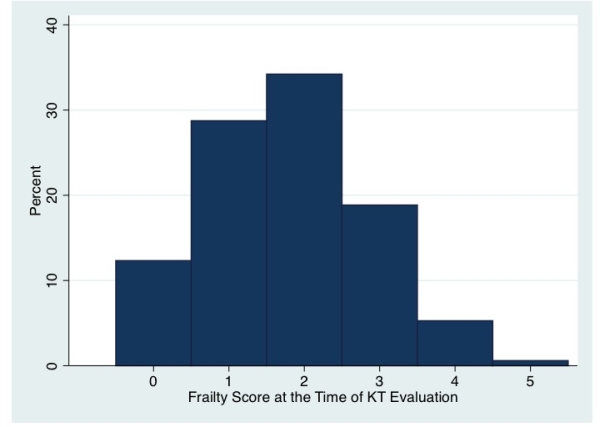Frailty in Patients Being Evaluated for Kidney Transplantation
Johns Hopkins, Baltimore.
Meeting: 2015 American Transplant Congress
Abstract number: C34
Keywords: Age factors, Kidney transplantation, Waiting lists
Session Information
Session Name: Poster Session C: Disparities in Healthcare Access
Session Type: Poster Session
Date: Monday, May 4, 2015
Session Time: 5:30pm-6:30pm
 Presentation Time: 5:30pm-6:30pm
Presentation Time: 5:30pm-6:30pm
Location: Exhibit Hall E
BACKGROUND: In patients undergoing hemodialysis, frailty prevalence is high and predicts mortality and hospitalization. Little is known about frailty in patients with ESRD who are being evaluated for kidney transplantation (KT) and whether frailty is associated with being listed for a KT.
METHODS: 1,517 patients being evaluated for KT (excluding patients being evaluated for a live donor KT) were enrolled in a prospective cohort study (January 2009 and May 2014). The Fried frailty score was measured at the time of evaluation (nonfrail=score of 0 or 1; intermediately frail=score of 2; and frail=score ≥3). We tested whether frailty was associated with being listed for KT at JHH after accounting for factors that are known to be associated with listing (age, sex, race, body mass index, education and employment status) using modified Poisson Regression.
RESULTS: At the time of evaluation, 34% were intermediately frail and 24% were frail.  64.7% of patients being evaluated were listed for KT at JHH. Of those who were listed, 23% had received a KT. The median time between evaluation and listing was 3 months (IQR: 1-6 months; range). Frail patients 1.36-fold (95% CI: 1.15-1.61, P<0.001) more likely to not be listed after evaluation for KT even after accounting for other factors.
64.7% of patients being evaluated were listed for KT at JHH. Of those who were listed, 23% had received a KT. The median time between evaluation and listing was 3 months (IQR: 1-6 months; range). Frail patients 1.36-fold (95% CI: 1.15-1.61, P<0.001) more likely to not be listed after evaluation for KT even after accounting for other factors.
| Nonfrail | Intermediately frail | Frail | |
|---|---|---|---|
| % at Evaluation | 41.1 | 34.2 | 24.7 |
| % Listed | 70.8 | 64.4 | 55.2 |
| Adjusted RR (95% CI) of listing | Reference | 1.15 (0.98, 1.36) | 1.36 (1.15, 1.61) |
CONCLUSIONS: There is a high prevalence of frailty among patients being evaluated for KT and those who are frail are less likely to be listed for a KT. These findings suggest that although frailty is not being measured as part of routine clinical care, patients who are frail are less likely to have access to KT.
To cite this abstract in AMA style:
DeMarco MMcAdams, Olorundare I, Desai N, Dagher N, Lonze B, Montgomery R, Segev D. Frailty in Patients Being Evaluated for Kidney Transplantation [abstract]. Am J Transplant. 2015; 15 (suppl 3). https://atcmeetingabstracts.com/abstract/frailty-in-patients-being-evaluated-for-kidney-transplantation/. Accessed February 15, 2026.« Back to 2015 American Transplant Congress
